


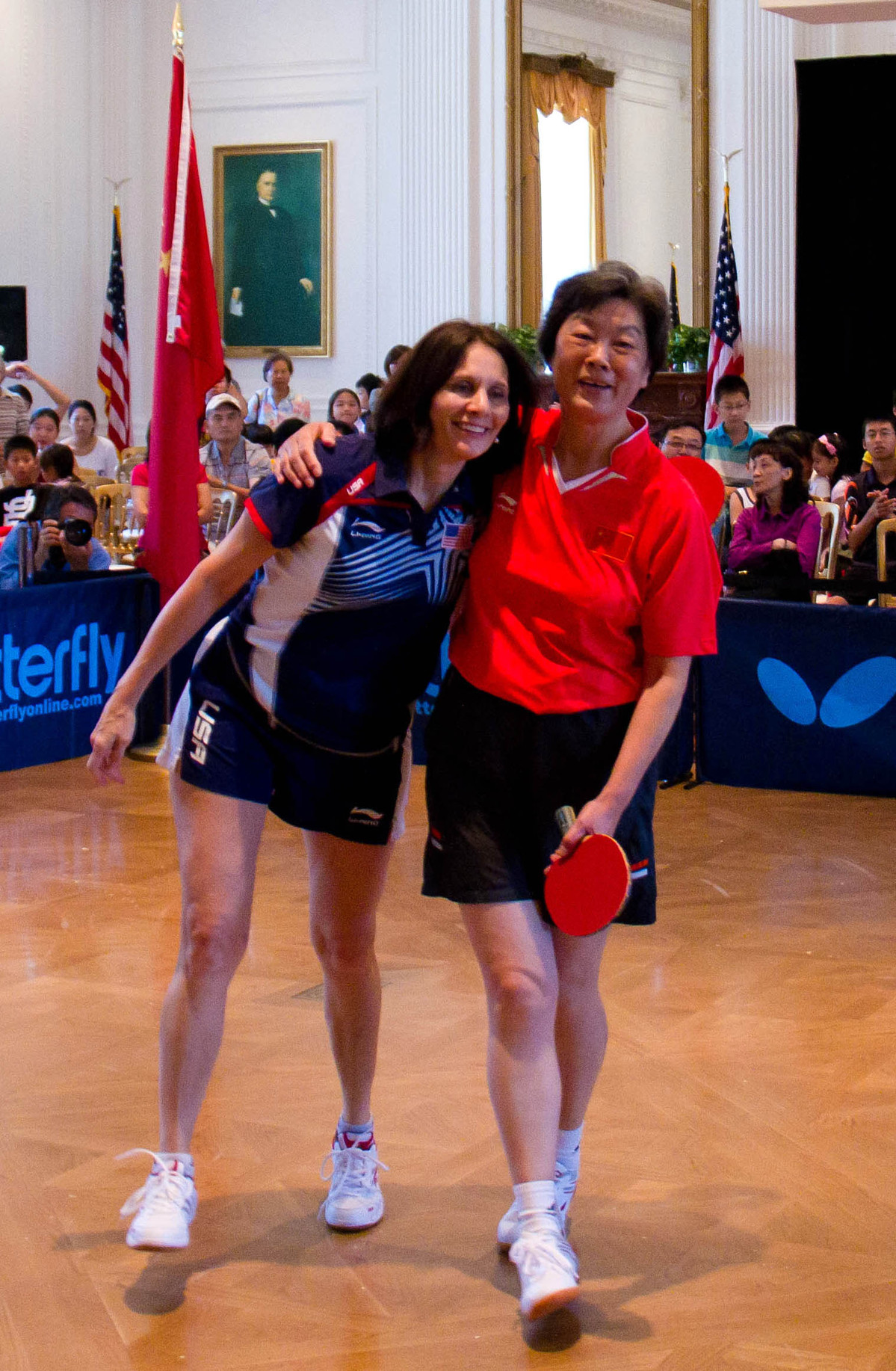
Rousing reception for anniversary event in Shanghai
Jeffrey S. Lehman, vice-chancellor of New York University Shanghai, the first higher education institute established between China and the US, started playing table tennis as a child in the basement of his home in Maryland, in the United States.
On Saturday afternoon, he was among 13 US citizens living in Shanghai and provinces neighboring the city who joined Chinese amateur players for a friendly match marking the 50th anniversary of Ping-Pong Diplomacy between the two countries.
The event commemorated the landmark visit to China by a 15-member US table tennis delegation on April 10, 1971.
On Saturday, 26 players from the two nations were paired together for doubles games. There were four teams for the event, which was organized by the Shanghai People's Association for Friendship with Foreign Countries and Shanghai University of Sport, among others.
Lehman was paired with Liu Sheng, vice-chairman of the Shanghai Foreign Investment Association.
Their team won third prize at the event, which attracted about 50 journalists, including more than 20 from overseas media organizations. The match was held at the International Table Tennis Federation Museum and China Table Tennis Museum.
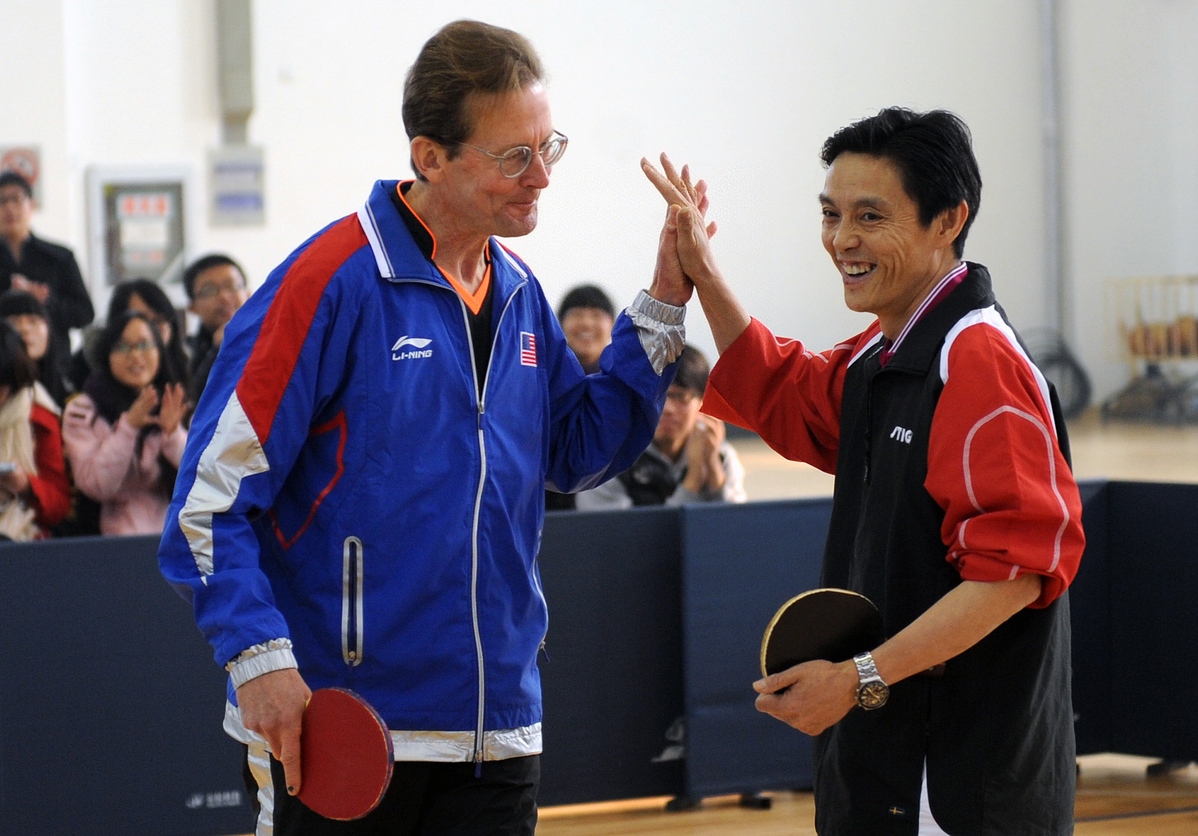
"The feeling of friendship in the room is really wonderful," Lehman said amid cheers and applause.
"When people have the opportunity for exchanges through sports or other interests that bring us together, we gain understanding of each other-and that helps break down barriers."
Lehman has always striven to bridge relations between the two countries. As president of Cornell University from 2003 to 2005, part of his job was to renew ties with China.
The US delegation arrived in China 50 years ago on Saturday at the invitation of the Chinese table tennis team.
After more than two decades of estrangement and antagonism between the two nations, the visitors played demonstration matches against Chinese players in Beijing, Shanghai and Guangzhou, Guangdong province.
Believed to have helped pave the way for people-to-people exchanges between the two nations, Ping-Pong Diplomacy also laid the groundwork for US President Richard Nixon's landmark one-week visit to China in 1972 and the establishment of diplomatic relations on Jan 1, 1979.
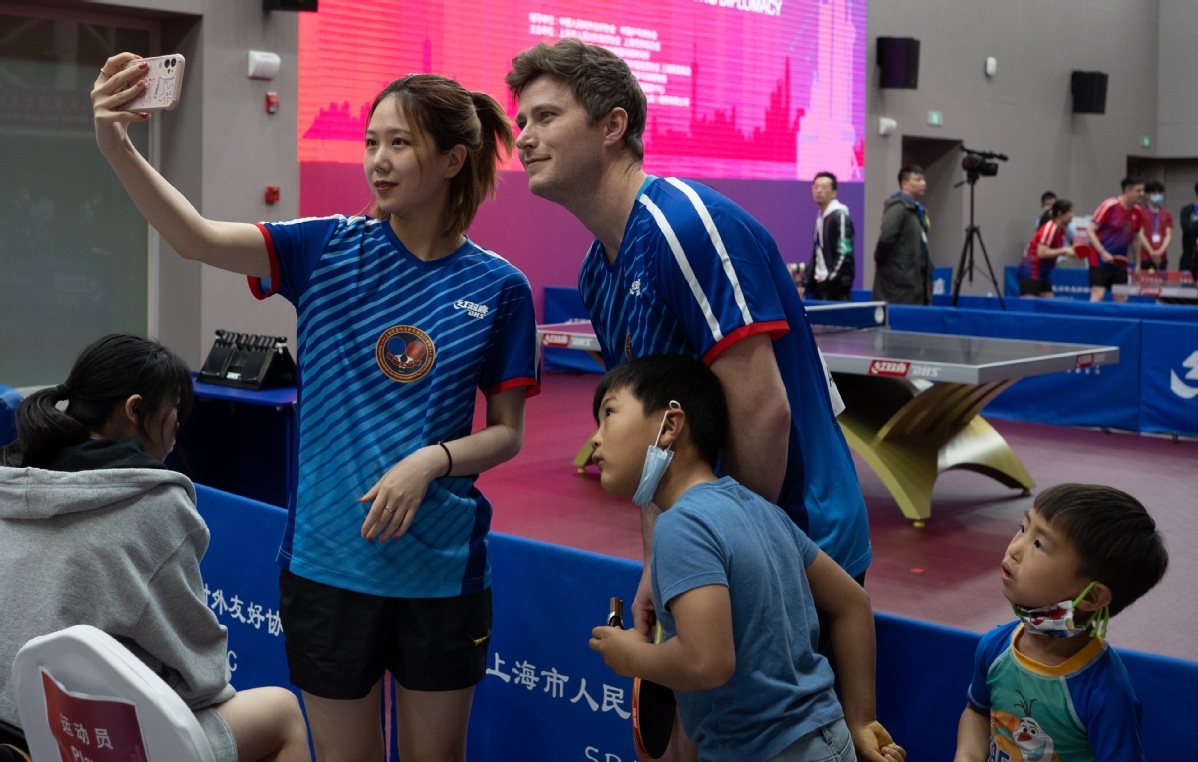
Cui Tiankai, Chinese ambassador to the US, said in a video address to the anniversary event: "People use the phrase 'the little ball moves the big ball' to describe China-US Ping-Pong Diplomacy. It indeed went beyond sports exchanges and had a far-reaching impact on shaping China-US relations and the global landscape.
"Today, the China-US relationship faces a critical choice as to its future path. The two sides should carry forward the spirit of Ping-Pong Diplomacy featuring mutual respect and seeking common ground while reserving differences … so as to ensure sustained and steady progress of our relations," he said.
James Heller, US consul general in Shanghai, said, "As Ping-Pong Diplomacy showed, sports can bridge differences and bring people together."
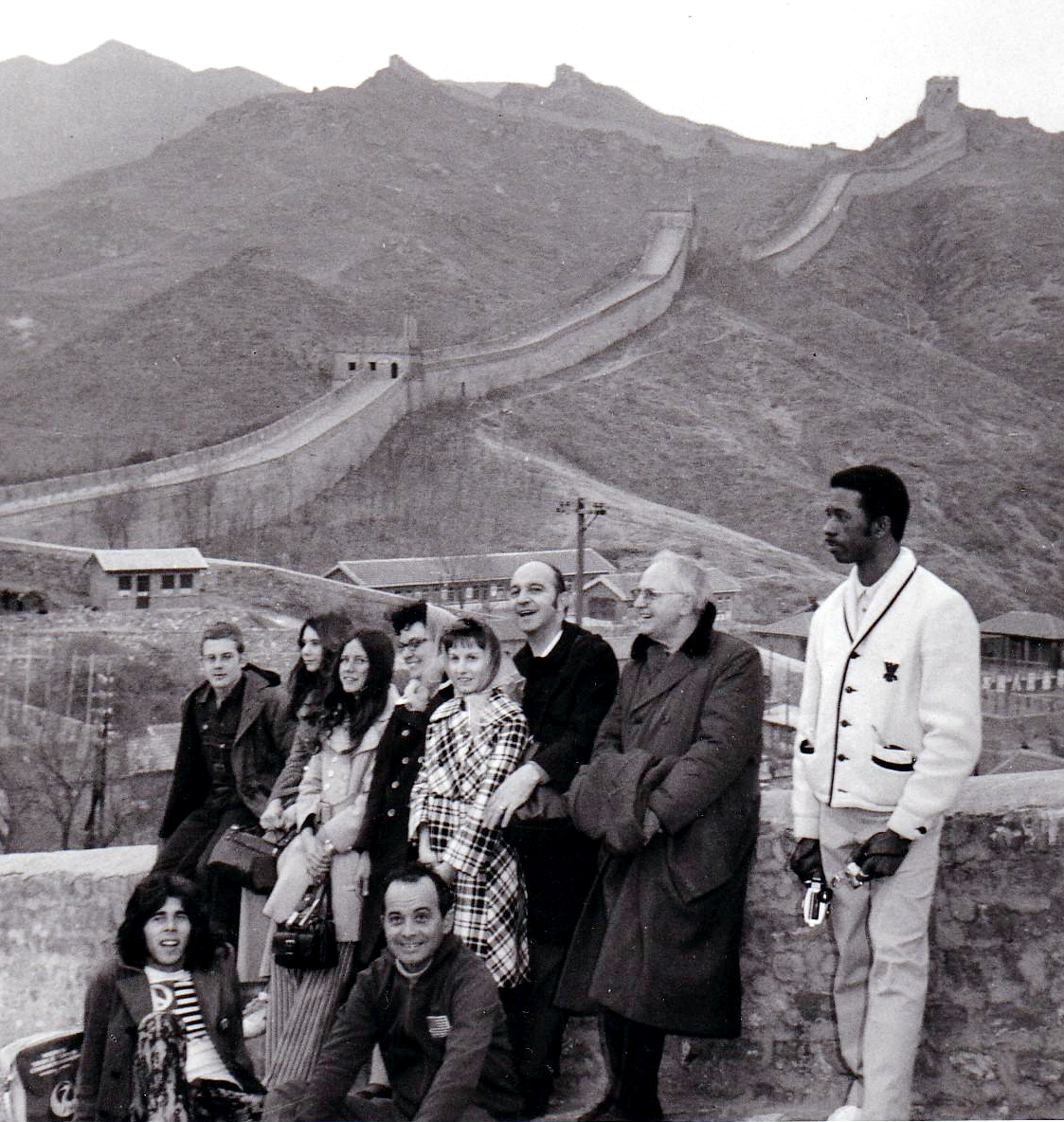
Bridging relations
Lehman said his father had a table tennis table at home and taught him how to play. He went on to represent his university team.
"Table tennis was a popular sport for kids when I was growing up and it has been a big part of my life," he said.
In 1972, one year after Ping-Pong Diplomacy was created, a Chinese table tennis delegation was invited to visit the US, and Lehman watched an exhibition match at the University of Maryland.
"I saw Zheng Minzhi, who was on the Chinese team at that match, and I'm excited to see that she's also here at the commemoration event today. I still have the program from that day," Lehman said.
He added that his passion for helping bridge relations between the two countries was triggered in 1998 during his first visit to China, where he met 10 professors from the US. At the time, Lehman was dean of the University of Michigan Law School.
The professors, who were all in their 90s, founded the Soochow University Law School in Shanghai early in the 20th century.
"Meeting those Americans, who spent a large part of their lives in the connection between China and the US, was very emotional for me. It made me think about how I wanted to live my life. I felt I was given this opportunity to act as a bridge between the US and China," Lehman said.
In 2008, he was invited to become founding dean of Peking University School of Transnational Law in Shenzhen, Guangdong. Four years later, he received calls from New York University and the Chinese government to serve as vice-chancellor of New York University Shanghai, which was still being established.
"I returned to Shanghai in 2012. Each year I'm here I feel more and more rooted to the city," the 64-year-old said, adding that there are table tennis tables at NYU Shanghai and he sometimes plays against faculty members.
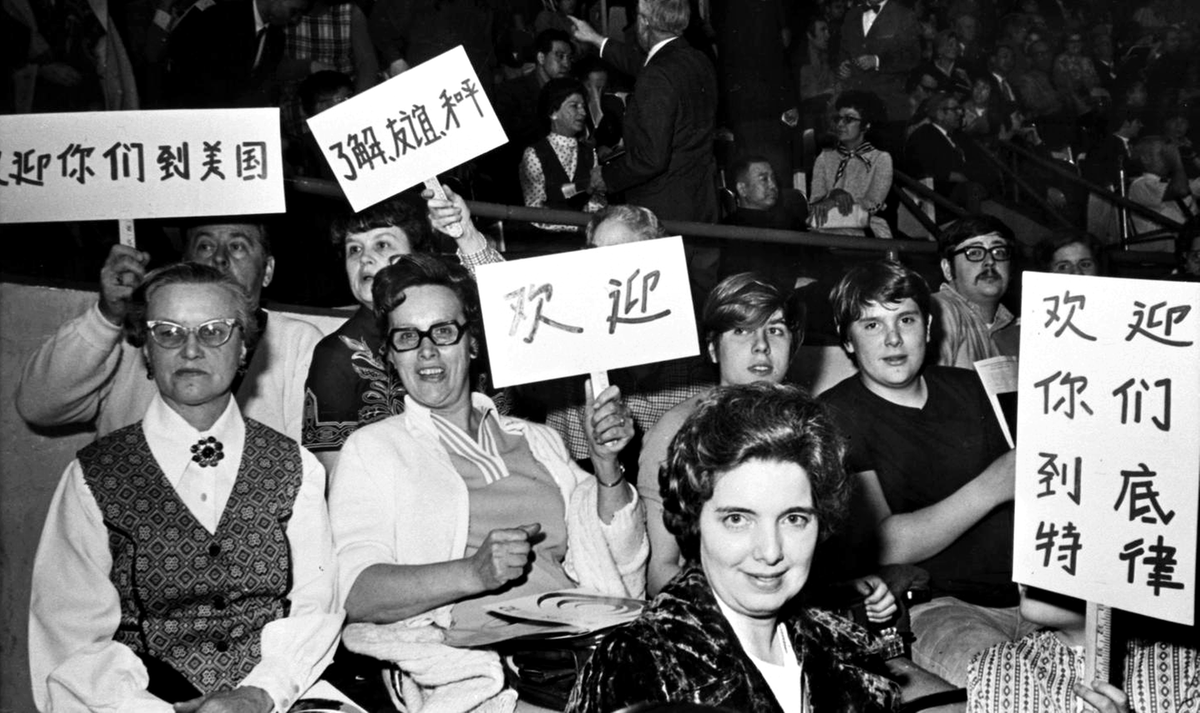
Another player at Saturday's event, Chris Miller, 30, from the Shanghai branch of the US-China Business Council, said he also had a table tennis table at home in Hawaii and played with family members and friends.
Miller said he initially did not plan to stay in Shanghai for long when he received a job offer, but later changed his mind.
"I enjoy both work and life in this vibrant city. Regarding the business environment, everything is very centralized and open here," he said.
Li Xinna, 22, one of the Chinese players taking part in the match on Saturday, who is a student at the China Table Tennis College, said preparations for the commemorative event began five weeks ago when participants from the two countries got together to train once a week.
"It was important for those paired together to spend time getting to know each other both personally and in terms of playing style," she said.
"Because each Chinese player was paired with an American player, we could share feelings of being nervous or happy together throughout the game."
Li was paired with Athena Messick, whose husband Owen is president of the China arm of doTERRA, an essential oils maker from the US.
Owen Messick, who has worked in Shanghai for 14 years, said it felt "great "to join the commemorative event.
"People in China and the US are always friendly to each other. All my friends from the US visiting me here love China and have very good impressions of the country and its people," he said.
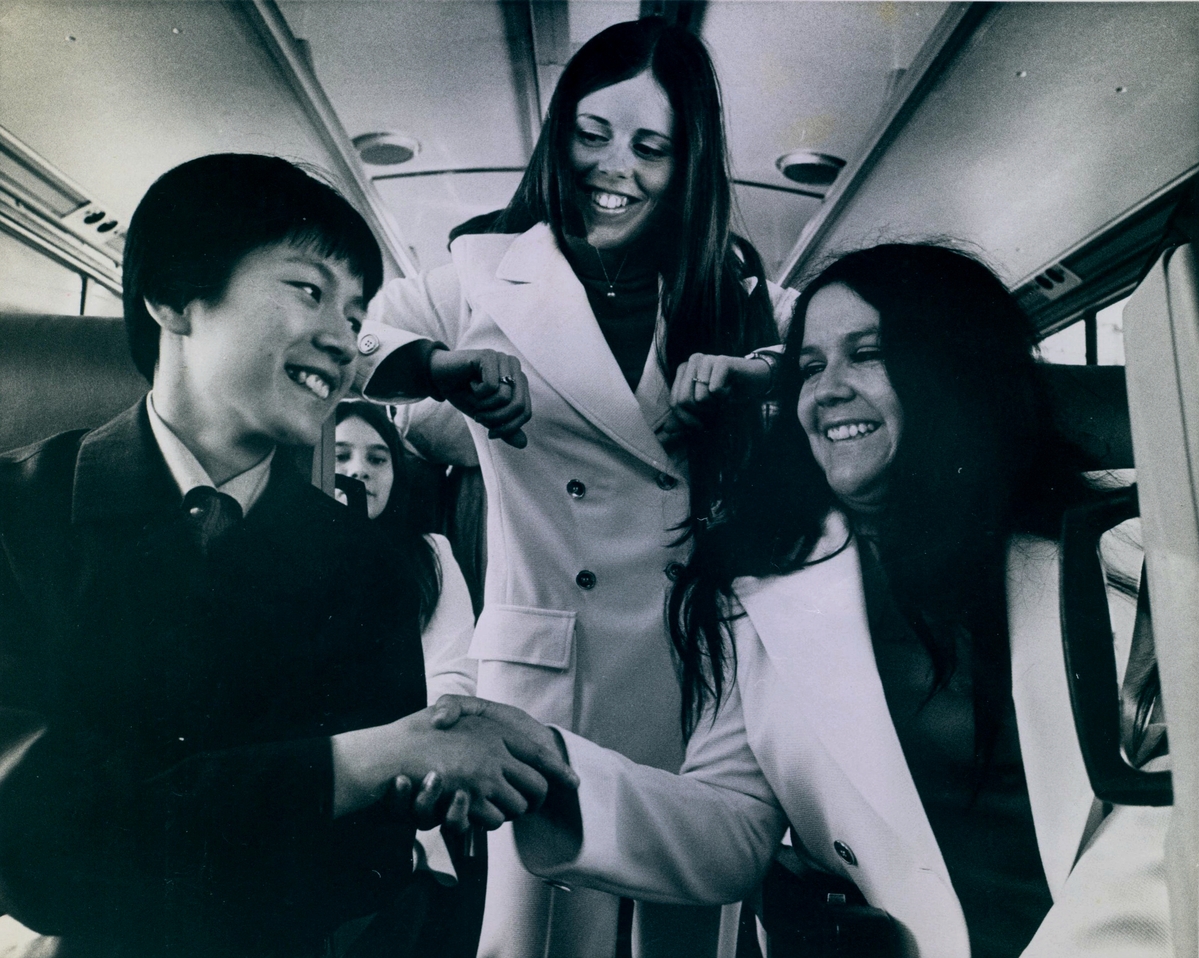
Golden memories
Connie Sweeris, 73, a member of the US delegation to China in 1971, sent a table tennis bat and ball she signed to organizers of the anniversary event from her home in Michigan.
She said that in addition to meeting Premier Zhou Enlai and shaking hands with him at the Great Hall of the People, other highlights of the trip included playing a friendship match in Beijing in front of 18,000 people and walking on the Great Wall.
"During the trip, the Chinese players let us train with them and showed us drills to practice so we could improve our game. The matches were very friendly and they even let us win some games," she said.
Judy Hoarfrost, whose maiden name is Bochenski, was the youngest player on the US delegation in 1971, when she was 15.
"I was told we were the first US group invited to China since the founding of the People's Republic of China. I felt that my role was to be a player and also a good ambassador for our country," she said.
Hoarfrost said international media attention remained focused on the trip for a long time and resulted in many interesting opportunities for herself and her teammates.
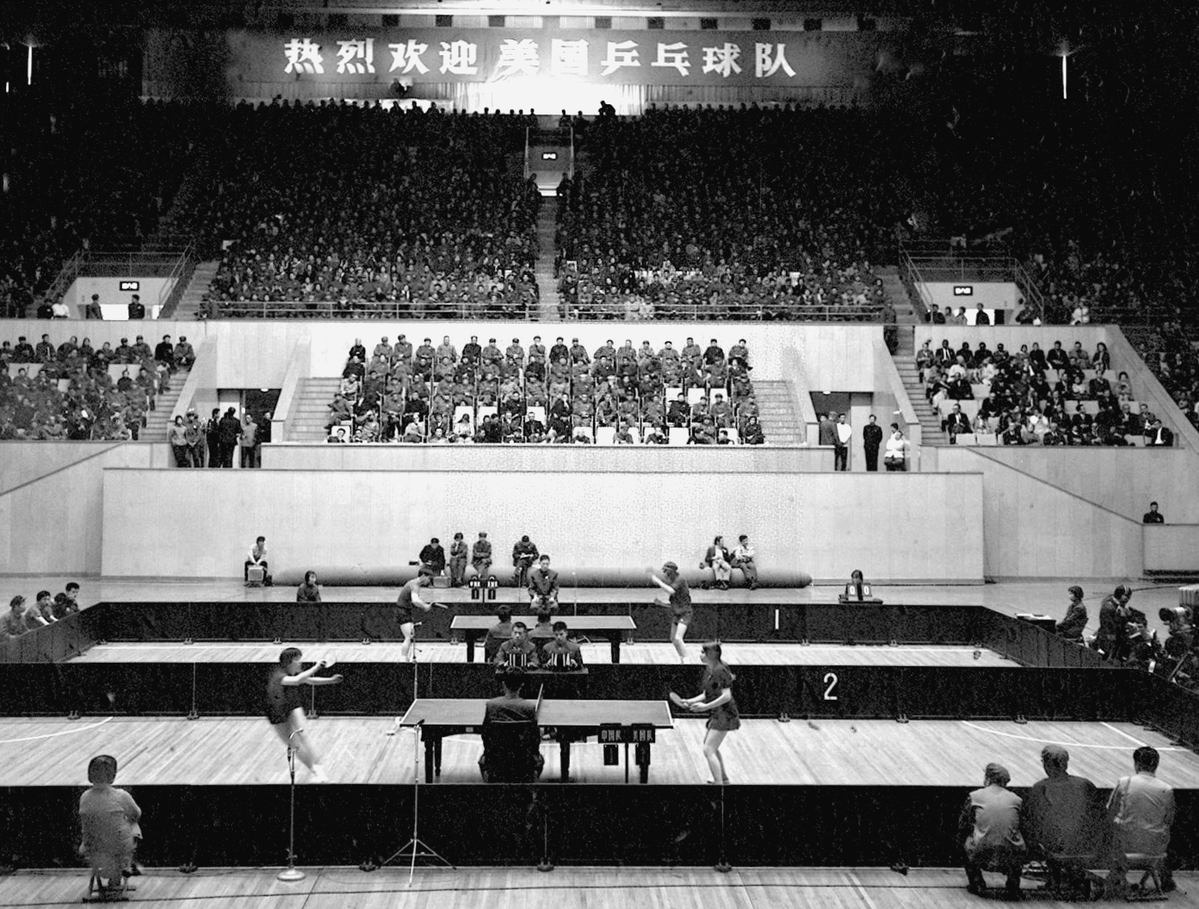
"Even today, I'm still called by news agencies to do interviews," she said.
She added that during the China trip, the US participants repeatedly heard the term, "Friendship first, competition second."
"This applied to the table tennis and also to the larger picture of what the trip symbolized for the two countries," she said.
Hoarfrost added that the local players who toured with them in China were happy to spend a long time answering questions and explaining their culture, politics and way of life. She also learned some Chinese phrases and songs.
Yao Zhenxu, 74, who played Glen Cowan from the US in Shanghai in 1971, was invited to the anniversary event.
He said Cowan was frequently hyperactive during the visit. "Because he dressed differently-like a hippy-he was often surrounded by many people. He also asked for Zhou Enlai's thoughts about hippies," said Yao, a former player with the national team.
In 1972, Zheng Minzhi was a member of the Chinese table tennis delegation that visited the US.
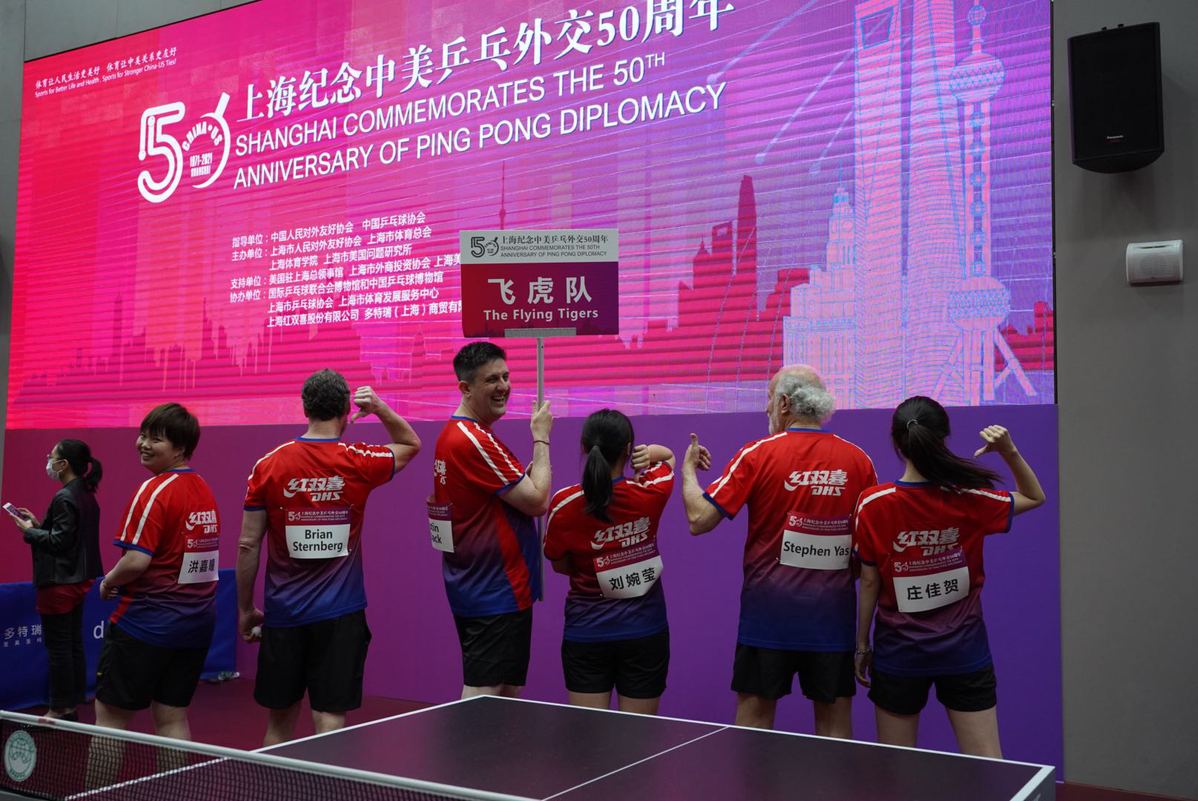
The group, the first from China to arrive in the US since the founding of New China, was received at the White House by Nixon before starting an 18-day visit.
Zheng, now 76, said they received a much warmer welcome than she had expected.
"I remember that when we went to an auto factory to play table tennis, the workers gave us a heartfelt welcome, which we could see from their facial expressions and body language," she said.
"I appreciate that Zhou Enlai, Chairman Mao Zedong and Richard Nixon had this forward-looking strategy that used a table tennis ball to open the gates to diplomacy," she said.
Ping-Pong Diplomacy reunion trips continue to be held in China and the US to mark key anniversaries, with many former players attending them.
Yao said, "People-to-people exchanges between the two nations over the years have become increasingly open and genuine. No matter the state of relations between the two governments, the civil friendship is unbreakable."
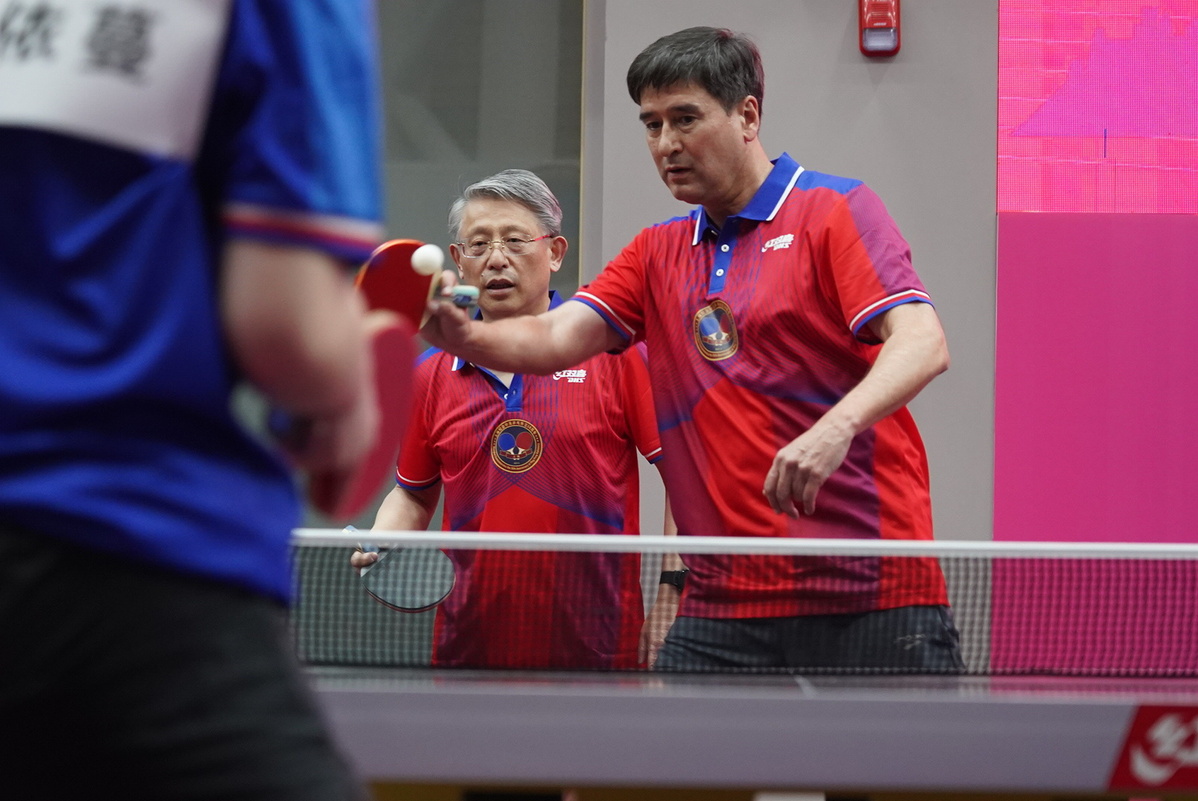
Overseas gifts
According to Double Happiness Sports, a sports equipment producer based in Shanghai, and sponsor of the commemorative event, the Ministry of Foreign Affairs is one of its biggest regular clients.
Lou Shihe, general manager of the company, which has been among the sponsors for six Olympic Games, said, "Many orders for our equipment have been placed by Chinese embassies and consulates as gifts for cities overseas, as table tennis is a signature Chinese sport."
For example, he said the company's products were offered as gifts in the US to a high school in Tacoma, Washington state, and to Latin American countries during President Xi Jinping's respective visits in 2015 and 2016.
"When delivering a speech to students and teachers from the school, President Xi recollected stories about Ping-Pong Diplomacy and encouraged teenagers from the two nations to boost exchanges and strengthen friendship," Lou said.
He added that he was later told that after receiving the equipment, table tennis had become one of the most popular activities for the students from Lincoln High School in Tacoma.
Since 2016, the school has arranged annual visits to China. Students have visited cities, including Beijing, Shanghai, Chengdu and Dujiangyan, Sichuan province, and Fuzhou, Fujian province. The school has also received exchange students from China.
In a letter written to Xi in February, Patrick Erwin, the school's principal, said, "As China and the US withstand the test of the COVID-19 pandemic, it is the best time for the students to play a leading role in helping the two nations support each other and recover."
If you have any problems with this article, please contact us at app@chinadaily.com.cn and we'll immediately get back to you.